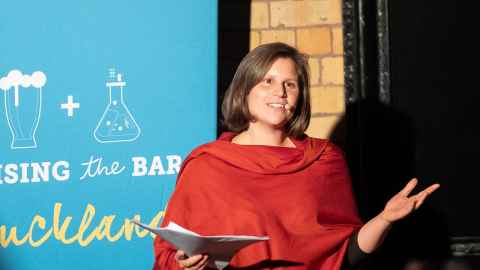The University goes down town
19 October 2018
For one night only, University of Auckland academics took over the city’s pubs and bars for the second annual Raising the Bar.

Of the 20 talks held in ten bars on the evening of 28 August, most sold out far in advance, with 2,600 people registered overall. But just in case you missed it, we’re giving you a taste, with summaries of two of the talks. And you can listen to podcasts of all of the lectures on soundcloud.
Don’t call it a crisis
Anna Hood, senior lecturer in the Faculty of Law (left, below), impressed on her audience at La Zeppa in Freeman’s Bay that the world is not suffering a “refugee crisis” as reported repeatedly, but that the overwhelming number of displaced people is a permanent feature of the international system – and that this needs to change.
“The world currently has 68.5 million displaced people and only a tiny percentage of them qualify for refugee status. This is because the definition of who is a refugee in international law is extremely narrow. It denies protection to large swathes of people despite the fact many of them face harm and persecution that is very similar to, and at times worse than, the harm and persecution faced by those who qualify as refugees.
“Even if we got the existing refugee system working perfectly through raising refugee quotas and freeing refugees from detention centres like those on Nauru, there would still be tens of millions of displaced people languishing in camps, slums and shanty towns around the globe. It is thus necessary for us to start broadening the conversation about the refugee crisis and how to tackle it. There is a need for fundamental changes.”
Politics and the arts
Associate Professor Nicholas Rowe from Dance Studies (right, below) posed some lively and challenging questions to his central city audience in Snickel Lane on how cultural exchange can be politically oppressive, and how political exclusion can be challenged through creative arts and community collaboration.
“While often promoted as benign, for centuries the arts have been used to advance colonial hegemony and to establish hierarchies of cultural power, while local arts activities are devalued.
“I am a community dance artist. This means I bring people together to creatively collaborate, to enjoy the communal creative process, and to value locally-inspired cultural products. To do this, I work in all sorts of locations, from refugee camps in the West Bank to urban slums in Asia, usually with people who find themselves ‘outed’ by policies and practices of exclusion.
“My work first involves lots of sharing of stories amongst the participants, leading into improvisations and compositions of dances … The people I work with explore meanings of a ‘public’ space, and find ways of making their creative ideas, and thereby themselves, more visual and more valued.”
Ingenio: Spring 2018
This article appears in the Spring 2018 edition of Ingenio, the print magazine for alumni and friends of the University of Auckland.